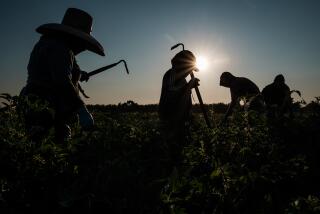Wyoming split over worker safety
- Share via
CHEYENNE, WYO. — This is a state anxious to shed its reputation as the most dangerous place in the nation to work.
For the last several years, Wyoming has outpaced the rest of the country in occupational fatalities. At more than three times the national average, the state had 15.6 fatalities per 100,000 workers of all kinds from 2005 to 2007, according to the Bureau of Labor Statistics.
But how to improve worker safety -- particularly in the oil fields, where roughnecks die at a higher rate than their counterparts in other states -- has become a source of contention among lawmakers, industry leaders and blue-collar workers.
Many support a governor-led task force charged with seeking ways to decrease such fatalities, with the help of federal safety researchers. A similar program in Alaska reduced fatalities by 49% over 10 years, said Gary Hartman, senior advisor to Wyoming Gov. Dave Freudenthal.
Yet a contingent of roughnecks -- led by a small-town mayor who once worked in Wyoming’s oil fields -- contends that real change won’t occur until the state makes it easier for injured workers to sue oil companies.
“These multibillion-dollar corporations are completely off the hook from taking care of you,” said Leo Beach, 38, whose hand was crushed in an oil field accident. “They turn their back on you. They should be held accountable.”
Industry representatives argue that paving the way for litigation would produce more lawsuits, not improve safety.
“The notion that operators don’t do everything they can every day [to ensure safety] is ludicrous,” said Paul Ulrich, a spokesman for EnCana Corp.
Oil fields are inherently perilous, he said. “I personally lost a family member on a rig,” he said. “Tragic, tragic, tragic, but it is reality at times in Wyoming.”
This marks the second year that lawmakers have taken up the emotional and divisive debate over the treatment of workers injured or killed, particularly in the oil patch.
This year, they passed a bill to boost workers’ compensation benefits to the survivors of all kinds of workers killed on the job. But some maintain that’s not enough -- that roughnecks or their survivors ought to able to sue the companies.
State law does not prohibit them from doing so, but in recent years courts have made it increasingly difficult for them to even try, said Riverton Mayor John Vincent, a lawyer who represents injured workers.
Roughnecks don’t work directly for oil companies but for independent contractors hired by the firms. The contractors, who pay into the state’s workers’ compensation fund, are immune from lawsuits.
The oil companies are not, and until about a decade ago, Wyoming courts routinely held that owners who maintained control over their work site owed a “duty of reasonable care” to their contractors’ employees.
Despite a 1986 state Supreme Court ruling to that effect, the courts in recent years began applying a new standard: To make a case, an injured worker had to prove that the operator maintained “pervasive” control over the site. Few, if any, workers have succeeded.
Yet, roughnecks say that oil and gas companies exert significant control over their sites -- and therefore should be liable for unsafe practices.
“But nobody is accountable for these injuries or deaths. The only person who pays is the injured party -- he pays with his limbs or life,” Vincent said.
Last year, Vincent enlisted his roughneck friends and hired a lobbyist to push legislation asserting that operators owed a duty of care to their contractors. The bill failed, but Vincent persisted, and this year a joint judiciary committee has drafted similar legislation.
Last week, roughnecks and construction workers gathered at the Capitol for a hearing, talking in hushed tones on one side of the lobby while men in suits clustered on the other.
Clad in denim and baseball caps, some bore the scars of their jobs. Kellee Cole, 39, had a damaged left eye from a construction accident; Robin Stedman, 50, used braces to walk after his leg was shattered and his brain damaged when he was forced to jump from an out-of-control crane speeding down a mountain road.
Others pointed to the ribs, elbows and jaws they had broken. In 35 years of roughnecking, Mike Beaver said, he’s helped remove the bodies of 10 friends killed on rigs.
“There’s never been any compensation for a lot of my friends who’ve lost their husbands,” he said, adding that he expects to be blacklisted for speaking out publicly. “But I ain’t scared of them.”
Advocates of the bill spoke at a hearing this summer. Opponents had their say at last week’s hearing, where state Rep. Roy Cohee criticized workers.
He said they willingly joined an occupation known for its hazards, as well as its high pay, at $20 to $30 an hour.
“They took a high-risk job. Are they willing to assume some of the consequences when they’re injured?” said Cohee, whose trucking company hauls materials for oil and gas operators.
A lawsuit could destroy his business, said Cohee, who joined other industry representatives in saying the proposed legislation would encourage more litigation without increasing safety.
It also would leave vulnerable anyone who hires a contractor to work on their home, said Marion Loomis, executive director of the Wyoming Mining Assn., echoing one of the chief concerns voiced last year.
The governor’s task force will be more effective at reducing injuries, said Bruce Hinchey, president of the Petroleum Assn. of Wyoming.
Researchers with the National Institute for Occupational Safety and Health are analyzing data and will present recommendations in the fall.
--
Correll writes for The Times.
More to Read
Sign up for Essential California
The most important California stories and recommendations in your inbox every morning.
You may occasionally receive promotional content from the Los Angeles Times.










